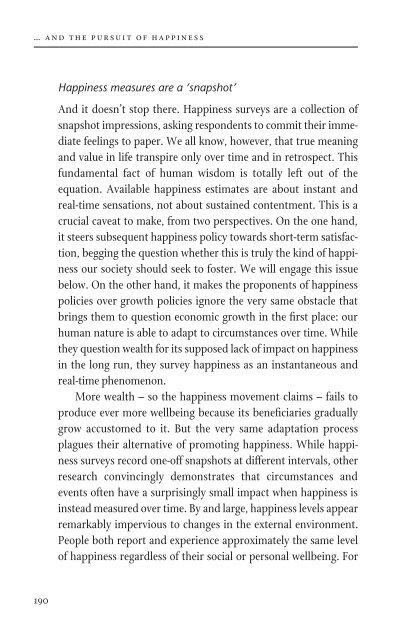… and the Pursuit of Happiness - Institute of Economic Affairs
… and the Pursuit of Happiness - Institute of Economic Affairs
… and the Pursuit of Happiness - Institute of Economic Affairs
You also want an ePaper? Increase the reach of your titles
YUMPU automatically turns print PDFs into web optimized ePapers that Google loves.
<strong>…</strong> <strong>and</strong> <strong>the</strong> pursuit <strong>of</strong> happiness<br />
<strong>the</strong> unbearable lightness <strong>of</strong> happiness policy<br />
<strong>Happiness</strong> measures are a ‘snapshot’<br />
And it doesn’t stop <strong>the</strong>re. <strong>Happiness</strong> surveys are a collection <strong>of</strong><br />
snapshot impressions, asking respondents to commit <strong>the</strong>ir immediate<br />
feelings to paper. We all know, however, that true meaning<br />
<strong>and</strong> value in life transpire only over time <strong>and</strong> in retrospect. This<br />
fundamental fact <strong>of</strong> human wisdom is totally left out <strong>of</strong> <strong>the</strong><br />
equation. Available happiness estimates are about instant <strong>and</strong><br />
real-time sensations, not about sustained contentment. This is a<br />
crucial caveat to make, from two perspectives. On <strong>the</strong> one h<strong>and</strong>,<br />
it steers subsequent happiness policy towards short-term satisfaction,<br />
begging <strong>the</strong> question whe<strong>the</strong>r this is truly <strong>the</strong> kind <strong>of</strong> happiness<br />
our society should seek to foster. We will engage this issue<br />
below. On <strong>the</strong> o<strong>the</strong>r h<strong>and</strong>, it makes <strong>the</strong> proponents <strong>of</strong> happiness<br />
policies over growth policies ignore <strong>the</strong> very same obstacle that<br />
brings <strong>the</strong>m to question economic growth in <strong>the</strong> first place: our<br />
human nature is able to adapt to circumstances over time. While<br />
<strong>the</strong>y question wealth for its supposed lack <strong>of</strong> impact on happiness<br />
in <strong>the</strong> long run, <strong>the</strong>y survey happiness as an instantaneous <strong>and</strong><br />
real-time phenomenon.<br />
More wealth – so <strong>the</strong> happiness movement claims – fails to<br />
produce ever more wellbeing because its beneficiaries gradually<br />
grow accustomed to it. But <strong>the</strong> very same adaptation process<br />
plagues <strong>the</strong>ir alternative <strong>of</strong> promoting happiness. While happiness<br />
surveys record one-<strong>of</strong>f snapshots at different intervals, o<strong>the</strong>r<br />
research convincingly demonstrates that circumstances <strong>and</strong><br />
events <strong>of</strong>ten have a surprisingly small impact when happiness is<br />
instead measured over time. By <strong>and</strong> large, happiness levels appear<br />
remarkably impervious to changes in <strong>the</strong> external environment.<br />
People both report <strong>and</strong> experience approximately <strong>the</strong> same level<br />
<strong>of</strong> happiness regardless <strong>of</strong> <strong>the</strong>ir social or personal wellbeing. For<br />
example, numerous studies have found that people with severe<br />
chronic health conditions report happiness levels that are close<br />
to those reported by healthy persons, <strong>and</strong> which are much better<br />
than healthy people believe <strong>the</strong>ir moods would be if <strong>the</strong>y had<br />
those conditions. Such gradual adaptation <strong>of</strong> our feelings <strong>of</strong> wellbeing<br />
to different circumstances is nei<strong>the</strong>r universal nor complete,<br />
but it is strong <strong>and</strong> persistent. 6 Circumstances that we can change<br />
through actions or policy thus clearly have a much smaller lasting<br />
influence on our subjective happiness than given factors such<br />
as genetic disposition. That raises an uncomfortable existential<br />
question for <strong>the</strong> happiness movement: if we shouldn’t care about<br />
economic growth because people adapt to wealth, why should we<br />
bo<strong>the</strong>r about happiness when people adapt to fortune <strong>and</strong> misfortune<br />
alike? Perhaps happiness preachers do not like marketdriven<br />
growth <strong>and</strong> prefer <strong>the</strong> political orchestration <strong>of</strong> happiness<br />
instead. Should we accept <strong>the</strong>ir preference as morally superior?<br />
A shallow form <strong>of</strong> happiness<br />
There are roughly two types <strong>of</strong> happiness. So-called eudaimonic<br />
wellbeing (from <strong>the</strong> Greek daimon – true nature) harks back<br />
to Aristotle <strong>and</strong> his conviction that true happiness is found by<br />
leading a virtuous life <strong>and</strong> doing what is worth doing, with <strong>the</strong><br />
realisation <strong>of</strong> our human potential as <strong>the</strong> ultimate goal. Then<br />
<strong>the</strong>re is <strong>the</strong> happiness that Aristotle found vulgar: <strong>the</strong> hedonic<br />
wellbeing derived from mere personal pleasure <strong>and</strong> contentment,<br />
traditionally associated with Jeremy Bentham <strong>and</strong> his strictly utilitarian<br />
approach to life. What kind <strong>of</strong> happiness is sought in <strong>the</strong><br />
6 See <strong>the</strong> overview in Gilbert (2006) <strong>and</strong> also Loewenstein <strong>and</strong> Ubel (2008).<br />
190 191












